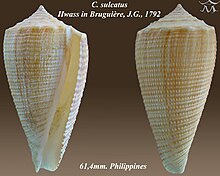Conus sulcatus, common name the grooved shell, is a species of sea snail, a marine gastropod mollusk in the family Conidae, the cone snails and their allies.[1]
| Conus sulcatus | |
|---|---|

| |
| Apertural and abapertural views of shell of Conus sulcatus Hwass in Bruguière, J.G., 1792 | |

| |
| Scientific classification | |
| Domain: | Eukaryota |
| Kingdom: | Animalia |
| Phylum: | Mollusca |
| Class: | Gastropoda |
| Subclass: | Caenogastropoda |
| Order: | Neogastropoda |
| Superfamily: | Conoidea |
| Family: | Conidae |
| Genus: | Conus |
| Species: | C. sulcatus
|
| Binomial name | |
| Conus sulcatus Hwass in Bruguière, 1792
| |
| Synonyms[1] | |
| |
Like all species within the genus Conus, these snails are predatory and venomous. They are capable of "stinging" humans, therefore live ones should be handled carefully or not at all.
Description
editThe size of the shell varies between 21 mm and 89 mm. The smooth shell shows revolving grooves crossed by longitudinal striae. The intermediate ridges are flat or rounded. The short spire is carinated, striate, sometimes with distant compressed tubercles. The ground color of the shell is light yellowish brown, or whitish.[2]
Conantokin-Br is a toxin derived from the venom of Conus sulcatus.
Distribution
editThis marine species occurs off Japan, Taiwan, in the Bay of Bengal and off the Solomon Islands, New Caledonia and Queensland, Australia.
References
edit- Bruguière, M. 1792. Encyclopédie Méthodique ou par ordre de matières. Histoire naturelle des vers. Paris : Panckoucke Vol. 1 i-xviii, 757 pp
- Holten, H.S. 1802. Enumeratio Systematica Conchyliae Beat. J.H. Chemnitz. Copenhagen : K.H. Scidelini 88 pp.
- Lamarck, J.B.P.A. de M. 1810. Tableau des espèces. Annales du Muséum National d'Histoire Naturelle. Paris 15: 29–40
- Sowerby, G.B. 1857–1858. Monograph of the genus Conus. 1–56, pls 1-24 in Thesaurus conchyliorum or monographs of genera of shells. London : Sowerby Vol. 3
- Sowerby, G.B. Jr. (1881). Descriptions of eight new species of shells. Proc. Zool. Soc. Lond. (1881): 635–639
- Cernohorsky, W.O. 1978. Tropical Pacific marine shells. Sydney : Pacific Publications 352 pp., 68 pls.
- Coomans, H.E., Moolenbeek, R.G. & Wils, E. 1982. Alphabetical revision of the (sub)species in recent Conidae 5. baccatus to byssinus, including Conus brettinghami nomen novum. Basteria 46(1-4): 3–67
- Motta, A.J. da 1982. Seventeen new cone shell names (Gastropoda: Conidae). Publicaçoes Ocasionais da Sociedade Portuguesa de Malacologia 1: 1–26
- Röckel, D., Korn, W. & Kohn, A.J. 1995. Manual of the Living Conidae. Volume 1: Indo-Pacific Region. Wiesbaden : Hemmen 517 pp.
External links
edit- The Conus Biodiversity website
- Cone Shells – Knights of the Sea
- "Asprella sulcata". Gastropods.com. Retrieved 16 January 2019.
- Puillandre N., Duda T.F., Meyer C., Olivera B.M. & Bouchet P. (2015). One, four or 100 genera? A new classification of the cone snails. Journal of Molluscan Studies. 81: 1–23
